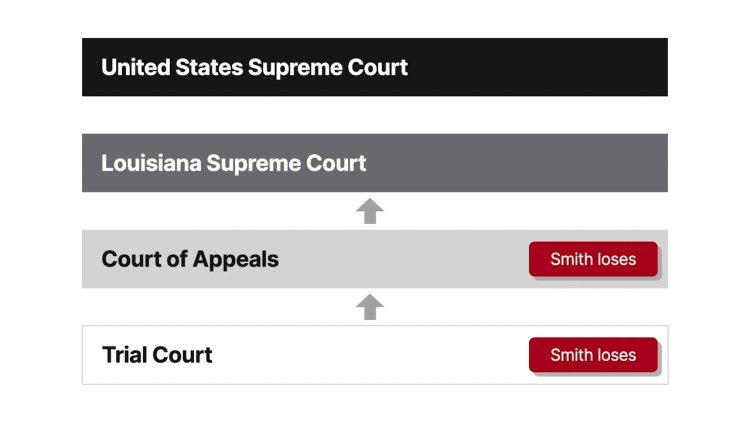Smith v. Cain
United States Supreme Court
565 U.S. 73, 132 S.Ct. 627, 181 L.Ed.2d 571 (2012)
- Written by Craig Conway, LLM
Facts
Larry Boatner testified that he was at a friend’s house when Juan Smith (defendant) and two others entered the home, demanded money and drugs, and then began shooting, resulting in the death of Boatner’s five friends. In court, Boatner identified Smith as the first gunman to enter the residence. No other witnesses or physical evidence implicated Smith in the crime. Smith was convicted on five counts of first-degree murder and he appealed. The Louisiana Court of Appeal affirmed the conviction and the Louisiana Supreme Court denied review, as did the U.S. Supreme Court. Smith subsequently filed for post-conviction relief in state court seeking information related to his case. As a result, Smith received notes and documents from Detective John Ronquillo, the lead investigator in Smith’s case, which directly contradicted Boatner’s testimony at trial. Ronquillo had made a handwritten account of a conversation he had with Boatner five days after the crime occurred in which Boatner said he was unable to identify any of the perpetrators and would not have known them if he saw them. Smith requested that his conviction be vacated. The trial court denied Smith’s request and both state appellate courts denied review. The U.S. Supreme Court granted certiorari to review.
Rule of Law
Issue
Holding and Reasoning (Roberts, C.J.)
Dissent (Thomas, J.)
What to do next…
Here's why 906,000 law students have relied on our case briefs:
- Written by law professors and practitioners, not other law students. 47,100 briefs, keyed to 996 casebooks. Top-notch customer support.
- The right amount of information, includes the facts, issues, rule of law, holding and reasoning, and any concurrences and dissents.
- Access in your classes, works on your mobile and tablet. Massive library of related video lessons and high quality multiple-choice questions.
- Easy to use, uniform format for every case brief. Written in plain English, not in legalese. Our briefs summarize and simplify; they don’t just repeat the court’s language.





